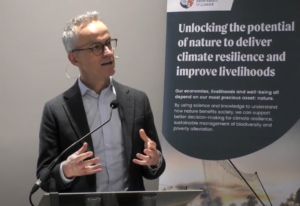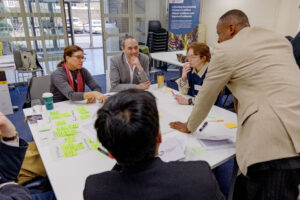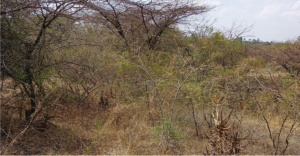The GCBC community is growing: Reflections from the 2025 GCBC Research Symposium
By Samantha Morris
In March, the GCBC community came together in person and online to share big ideas, transformative practice, and stories of impact at the 2025 Research Symposium.
Support for research tackling the impacts of climate change, biodiversity loss, and poverty is essential. The GCBC is a programme that does this and more, bringing together researchers and practitioners from around the world to unlock the potential of nature to deliver climate solutions and improve livelihoods.
Each year the GCBC hosts a research symposium to share big ideas, transformative practice, and stories of impact. This year the research symposuim was bigger than ever with a full three-day programme, including the first ever GCBC Open Day on Tuesday 4 March.
This year’s symposium was a fully hybrid event, with online attendance supported throughout as part of the GCBC’s commitment to reduce barriers to global engagement within and beyond our growing community
Watch the GCBC Research Symposium Open Day here.

The GCBC Research Symposium Open Day shone a spotlight on results from across the programme highlighting important cross cutting issues for the programme including innovative research practice, working with the private sector, and connecting research and policy.
After a warm welcome from Kew’s Professor Monique Simmonds, OBE and Deputy Director of Science – Partnerships, the day officially began with opening addresses from Professor Alexandre Antonelli (Royal Botanic Gardens, Kew), Professor Gideon Henderson (Defra) and Kate Hargreaves (DAI) who all shared their reflections on why research at the intersection of biodiversity loss, climate change, and poverty alleviation is so critical right now.
Professor Tim Wheeler, Deputy Director of International Science at Defra, spoke next hosting the first panel of the day: Contributing to global goals, the science behind frameworks and targets. Joining him were Dr Constanza Gonzalez Parrao (3IE), Dr Aster Gebrekirstos Afwork (CIFOR-ICRAF), Wendy Toro (CIASE), and Rithiny Teng (WCS Cambodia).
The second panel of the day was hosted by research uptake expert Louise Shaxson, and tackled the important issue of influencing policy and decision makers with research evidence. Louise was joined by a panel of five GCBC research project representatives both in person and online: Professor Elizabeth Cottier-Cook (SAMS), Dr Euridice Honorio (RBG Kew), James Mutunga Joshua (Nature Kenya), Fiona Nunan (University of Birmingham), and Damian Sulumo (MVIWAARUSHA). Louise and the panellists drilled down into a variety of new ideas and creative approaches to using research evidence to influence policy and practice.
The final panel of the day took on the challenge of how to harness private sector investment for nature based solutions. Panel chair George Whalley was joined in person and online by six panellists from a variety of sectors and backgrounds to tackle the question: what are the practical steps to harnessing private sector investment, and how do we get money flowing into biodiversity projects? The panellists were: Susan Forester (FSD Africa), Alicia Gibson (Finance Earth), Drea Burbank (Savimbo), James Naughton (DAI), Julia Martin-Ortega (University of Leeds), and Scobie Mackay (Imperative).
On the remaining two days, the symposium programme focused on connection and collaboration within the current group of funded GCBC research projects. With over fifty representatives at Kew in person and more joining the programme online it was a productive and busy couple of days covering early results, best practice approaches and innovative methods.

Overall, the 2025 Symposium was a collaborative and inspiring event. An opportunity to deepen existing connections within the GCBC research community and to build new links with a wider network of partners and organisations committed to working at the intersection of climate change, biodiversity loss, and poverty alleviation.
Thank you so much to all members of our GCBC research community who joined us in person and online for the symposium, and to our wonderful speakers, panelists, and chairs for your insights, expertise, and for generously giving your time to be with us.
All funded projects are listed on the GCBC website here.








